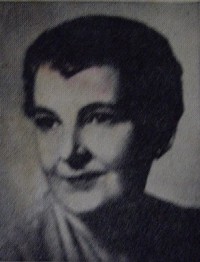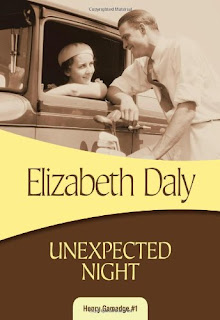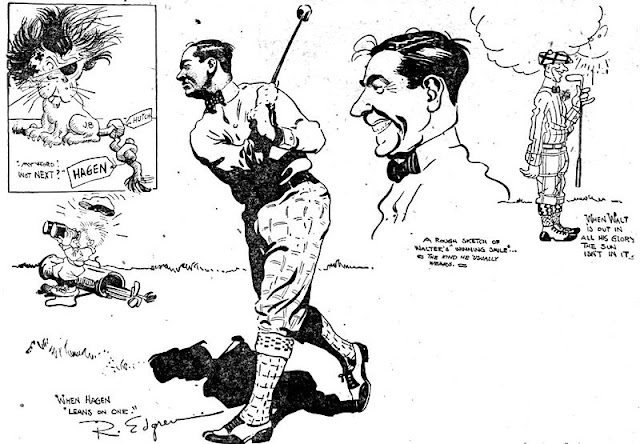Amberley Cowden is found dead
the morning of his twenty-first birthday, the day he inherits a
million dollars. A Gypsy finds the body on a beach near the hotel
where Cowden had checked in shortly after midnight with a gaggle of
relatives who are now in line at the legacy trough. His younger
sister's first in line. Hmmmm.
Here's what we know:
Unexpected
Night is Elizabeth Daly's first novel. She was
sixty-one when it was published in 1940. This apparently puts it in
the category of a classic golden age mystery, which means the
detectives are faced with an unimaginably complicated
whodunit-and-why puzzle. So are the readers. Unfortunately I'm not so
keen on puzzle mysteries, which strike me as more than a tad
gimmicky, and, slow and inattentive as I tend to be, am often
bewildered by the crudest and simplest of gimmicks. Unexpected
Night left me gasping so desperately I came dangerously close to
hyperventilating. And not only from just the plot. The aspects of a
novel that interest me most are voice, character, and mood. These
work best for me when they merge into a narrative point of view. I
prefer crime novels that put me inside or in close proximity to the
detective's mind, or that of his loyal sidekick/biographer. It even
worked for me identifying with the victim in Patricia Wentworth's In
the Balance. For me the so-called universal viewpoint in
this kind of genre novel is too impersonal, too thin and distant. It
was my main problem, above and beyond its maniacal puzzle plot, with
Unexpected Night.
Making allowances for this
being the debut novel of a 16-book series of which I've yet to read
any of the rest, I enjoyed the mysterious, atmospheric beginning,
four of the central characters driving through a foggy Maine night
from somewhere to a rendezvous at a cabin where four other central
characters are playing bridge. Right away, though, the
too-many-characters flag went up and I knew I'd have to start
concentrating on who was who and how they were related to one
another. Daly sets the picture by providing essential data soon as
they're all together in the same room, but for me it was still a tad
daunting trying to digest who were siblings and who was cousin to
whom and which aunt was the loony toons, and which stiff ass was the colonel
and which the lieutenant, and then there was Henry Gamadge, described
only as a "guest from the hotel."
Of course from the cover I
knew this was a Henry Gamadge mystery, and from crime writer Sarah
Ward's blog I learned the early editions of Daly's work
contain this "potted" bio of her detective: Henry
Gamadge is an intelligent, well-educated upper-class New Yorker who
is an expert on antiquarian books, maps, prints and autographs. He
lives in New York’s fashionable Murray Hill district and although
ostensibly working as an expert on old papers, he often undertakes
investigations connected to his work.
And, in Unexpected Night,
we learn Gamadge "wore clothes of excellent material and cut;
but he contrived, by sitting and walking in a careless and lopsided
manner, to look presentable in nothing. He screwed his grey tweeds
out of shape before he had worn them a week, he screwed his mouth to
one side when he smiled, and he screwed his eyes up when he pondered.
His eyes were greyish green, his features blunt, and his hair
mouse-coloured. People as a rule considered him a well-mannered,
restful kind of young man; but if somebody happened to say something
unusually outrageous or inane, he was wont to gaze upon the speaker
in a wondering and somewhat disconcerting manner."
 |
| Elizabeth Daly |
As to his detecting skills we
don't really find out until a murder inquest when he sums up all of
the "evidence" he and apparently only he (and perhaps the
well-experienced and uncannily astute reader) has noticed and logged
in his head along the way. I suspect a possible pyschic influence at
work in persuading Mitchell, the state police investigator called in
by the local sheriff to look into the young heir's death, to turn
over pretty much everything to Gamadge, agreeing enthusiastically
with his every suggestion and allowing him to order people around and
arrange for deputies to do whatever he feels they should do.
Mitchell's role is little more than Gamadge's assistant. Only one
person challenges Gamadge, and that's near the end. The attorney
representing one of the two families at the inquest, who, after some
initial harumphing, is soon on board, agreeing with Gamadge's
presentation of the circumstantial evidence, staring agape with
everyone else as the murderer confesses during the inquest,
congratulating Gamadge on his brilliant detective work, and offering
him the job of chief investigator and emeritus senior partner in the
attorney's silk stocking New York law firm. (Part of the previous
paragraph is intended as humor, a gratuity for those experienced and
astute mystery readers who love to parse out and savor such anomalies
for their private amusement. In keeping, I hope, with the occasional
nugget of genuine humor I, somewhat less astute than most, found
leavening the ubiquitous chittery chattery intercourse among the characters. I include a couple of thigh-slapping
examples below, both of them uttered by Henry Gamadge:)
“What is this business of
yours, Mr. Gamadge?”
“It has no name. But if
somebody wants to sell you a rare old pamphlet about Nell Gwyn, with
Charles the Second’s autograph on the flyleaf and marginal notes by
Louis the Fourteenth, I’ll perhaps be able to tell you whether it
was made later than 1900, and what part of Michigan it came from.”
***
"Gamadge remarked:
'I should have said there was nothing terrifying about Mrs. Barclay
but her opening four bid at bridge.' ”
***
One
observation that's stuck in my craw is the golf ball driven from afar
by someone unseen that comes
within a hair of hitting the teenage potential heiress smack on the
head. Gamadge insists this
was no accident. I've done a
little golfing in my salad years and I would be willing to bet a
Dreadnought 3 ball
autographed by the great Australian golfer Walter Hagen himself that
not even Hagen could be so accurate with a 100-yard drive if his life
depended on it. I consider this scene something of a stretch on Ms.
Daly's part—actually, enough of a stretch to elicit from me
something of an almost audible harumph.
[For
more Friday's Forgotten Books check the links on Patti
Abbott's unforgettable blog]


I read one of the Gamadge novels titled MURDERS IN VOLUME 2, years ago, and vaguely recall thinking it all right but not one that'd make me seize upon others in the series unless there were no other choices. Having also played some golf--and admittedly not well--decades ago, I agree that the Walter Hagen precision you describe is straight out of a cartoon or another planet. It would thus be an UNEXPECTED NIGHT for me to read this over another novel, Golden Age-variety, given your own review experience.
ReplyDeleteSince this is the first of Elizabeth Daly's mysteries, I am sure I will reread it some day, since I have completely forgotten the plot and everything else. Right now I am planning on reading the remaining two of her books I have not read. I think one of those is fairly early in the series, not sure about the other.
ReplyDeleteTracy, I tend to forget plots within days of reading them, especially the ones that strain credibility. But I can overlook that element if I like the characters and the narrative voice. There was too much frantic chattering in this one for my taste, and I couldn't really identify with Gamadge because I never got to share his thinking.
DeleteIt is definitely true (at least in the book I read recently) that Gamadge's thoughts are not shared ... at all. In that book I felt like the unusual plot made up for it, and I liked the picture of the times.
DeleteI recall you said that irritated you in The Book of the Dead, so I was prepared for it. Doesn't work for me. :)
Delete